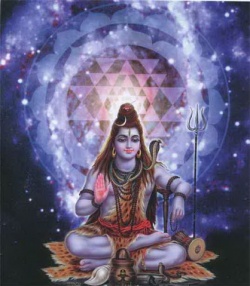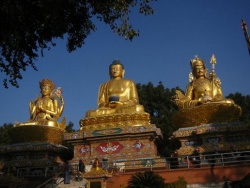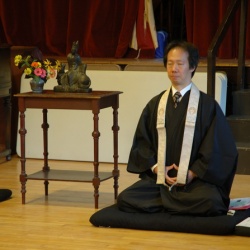Reading Sutras
I have had many good experiences with reading sutras. In hand now, i have ‘A Treasury of Mahayana Sutras’ translated by CC Chang, which is a collection selected from the Maharatnakuta Sutra. Often when I read the Sutras, i feel a great sense of awe for the Triple Jewels (Buddha, Dharma and Sangha). These teachings came directly from Buddha, a fully enlightened and omniscient being. Someone who is very rare in this world. We often idolise people who are very smart, rich, creative, artistic, stylish, beautiful, talented, etc. But most times, we may not feel a fraction of that veneration for the Buddha because we can’t understand his qualities in a concrete manner. Through reading the Sutras, it is 100% possible to actually get a deep feel of the Buddha’s incredible compassion, wisdom and power. I think many people are quite familiar with the commentaries and oral teachings from Gurus and so forth, but this is not the same as the feeling of reading the actual Sutras which is our closest connection to the actual Buddha’s teachings and this gives us a deeper appreciation of the qualities of enlightenment and what it actually entails.
When we get nearer to feeling what a truly enlightened Buddha is like, then automatically our devotion to our own teachers grow. In the Vajrayana, we are always trying to have a pure perception of our teachers as Buddhas to increase the benefit of the lineage and Guru’s blessings through deeper receptivity. But if there is no sense of what a Buddha is like in the first place, we are also limited in our appreciation for our own teachers. To the extent that our understanding faith in the Triple Jewels grow, our faith in our teachers can also grow.
The truths espoused in the Sutras are free from the constraints of time, space, culture. They are not slanted by any views from limited experience but come from a vast perspective of unlimited wisdom. They are not limited by contemporary conventions or expectations of contemporary people, so when the Buddha spoke, he taught as what it was, without diluting it to fit the beliefs of present-age people as some teachings are apt to do nowadays.
When we read these Sutras, we begin to really feel a kind of veneration for our lineage or heritage of the Dharma teachings. We begin to appreciate just how much it takes for enlightenment to arise. We begin to lose our complacency, arrogance and all that taking things for granted. Because we are able to humble ourselves once more, our mind regain its purity and becomes a vessel for the teachings and blessings. We begin to see the suffering of samsara more clearly. We begin to generate bodhichitta. A strong understanding and trust in Cause-and-Effect arises in our mind. Often the sense of impermanence and a strong determination to practise the Dharma can arise just from reading the Sutras.
Through the Sutras, we can learn many finer points of conduct in daily life. We refine our mental compass of what is right / wrong, what should be adopted / avoided. These are things that we may never learn in our life from another living person, but the best teacher in many aspects can come from the Sutras. That is why in the Sanghata sutra, it is said, ” The Sanghata teaches, out of kindness, even through the bodies of Buddhas… It teaches in the form of a Buddha. It teaches the very essence of Dharma. Who wishes to see a Buddha, Sanghata is equivalent to a Buddha. Wherever the Sanghata is, always, there the Buddha is.” Thus it is said, the Sutras can also be our teacher. Many of the sublime qualities can take root and increase in your mind through reading the precious Sutras. These come through the blessings of the wisdom of Buddha.
Sometimes, when we go and see the Guru, although we wish to have Dharma teachings but we do not know what to ask or how to request for a suitable Dharma teaching. Or we may not have the merits to know what teachings we need or should request. We may request for something entirely inappropriate or useless to us. But in the Sutras, these teachings are often requested by great Bodhisattvas for the benefit of beings to the Buddha himself and the answers are very profound and usually cover many different points. Now, through the Sutras, these teachings are already there, it is only for us to read it and integrate it into our mind.
As Sutras are the words of truth, just reciting the words of Buddha can bring about many beneficial effects like increasing your merits, turning your mind towards Dharma, curing sicknesses, removing obstacles, blessing the area/country etc. It is said that the Sutras are highly venerated by all kinds of unseen beings and Dharma guardians who would do circumambulations around these texts to pay their respect and accumulate merits. Truly, the Sutras are the very repositories of the highest wisdom in the universe.
I always encourage people to read the Sutras. It does not matter which vehicle it is from. Whether it is the Mahayana Sutras or the Theravadan collection of Buddha’s discourses, they are replete with wisdom and blessings. Everyone can increase their understanding, faith and wisdom through reading these Sutras with respect. We should also treat these Sutras with respect, placing them in clean and high places. Some people offer incenses before they begin to read the Sutras, some people wash themselves and dress neatly when they read the Sutras. There is no fixed rule but it is always up to your own level of sincerity and respect that brings the corresponding benefit to your mind.
To end: I would like to quote the Sutra of Assembled Treasures:
“That day, the World-Honored One told Mahakasyapa, “Four things cause a Bodhisattva’s wisdom to decrease or be lost. What are the four?
1. To disrespect the Dharma or Dharma-masters;
2. To withhold the profound Dharma he has acquired instead of disclosing it fully;
3. To hinder those who rejoice in the Dharma by giving them reasons to despair; and
4. To be arrogant and conceited, and to disdain others.
Furthermore, Kasyapa, four things cause a Bodhisattva to gain great wisdom. What are the four?
1. Always to respect the Dharma and revere Dharma-masters;
2. To preach widely whatever Dharma he has learned, with a pure mind not in pursuit of fame or profit;
3. To know that wisdom arises from much learning, and to pursue learning with such constant, urgent effort as if to save his head from fire; and
4. To recite the Sutras he has learned, and practice cheerfully as instructed, without becoming entangled in words.
(You can see a scanned copy of this sutra here http://profcohen.net/ltwl147/ratnakuta.pdf)
May all beings perfect their wisdom and attain Omniscience and Buddhahood swiftly!


